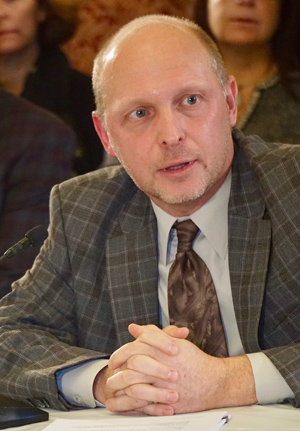Advocates Call For Vaccination of High-Risk DD Population And Caregivers
/By Gina Macris
While there is growing research that COVID-19 puts people with developmental disabilities at a higher risk for serious illness or death than virtually any other compromised group, Rhode Island’s disability rights advocates remain uncertain whether the state will follow through on intentions to include this population in the initial vaccination phase.
Since the pandemic hit Rhode Island last March, it has affected nearly 30 percent of adults with developmental disabilities living in group homes and an uncounted number of others with intellectual or developmental challenges living in other settings. A total of about 550 group home staff have tested positive for the virus.
On Dec. 28, the Centers for Disease Control (CDC) announced that it had added Down syndrome — one of the most common developmental disabilities — to the list of conditions that put people at risk from serious illness or death from COVID-19.
People with Down syndrome are at higher risk for early-onset dementia as well as congenital heart disease, obesity, gastrointestinal disorders, and other chronic medical conditions.
On Jan. 8, the chair of the Rhode Island Developmental Disabilities Nurses Association (RIDDNA), wrote to the state’s public health epidemiologist, as well as coordinators for vaccine distribution, seeking confirmation that Phase 1 vaccinations, now underway, will include adults with developmental disabilities and the nurses and direct care staff who work with them.
Others are also pressing for similar assurances from officials of the Department of Health (DOH), including the health department’s counterparts at the state Department of Behavioral Health, Developmental Disabilities and Hospitals (BHDDH) and the Community Provider Network of Rhode Island (CPNRI), a trade association of private service agencies operating group homes and offering daytime services to adults with developmental disabilities.
Tina Spears, CPNRI’s executive director, said initial advice from DOH was that adults with developmental disabilities are to be prioritized for vaccination in the ongoing Phase 1 distribution.
At the same time, this population does not appear on the patient list of the CVS-Walgreen’s partnership assigned by DOH to handle long-term care vaccinations, Spears said.
She said state officials need to “step up” and make the Phase 1 designation explicit.
The DOH COVID-19 portal says Phase 1 includes “long-term care facility staff and residents” but does not specifically mention adults with developmental disabilities. As examples of long-term care settings, DOH lists “group homes for individuals primarily 65 and older, assisted living, (and) elderly housing with residential services.”
Spears, meanwhile, said that she considers anyone eligible for developmental disability services from BHDDH to be receiving long-term care, whether in a residential setting or during the day in the community.
Fournier, the chair of the nurses’ group, highlighted the conclusions of research that has shown adults with developmental disabilities have greater incidences of the same underlying chronic medical conditions that have already been recognized as risk factors in non-disabled adults. These underlying conditions include heart disease, diabetes, various cancers, and asthma, as well as obesity and seizure activity.
Fournier cited joint recommendations of the American Academy of Developmental Medicine and Dentistry (AADMD) and a coalition of more than a dozen nationwide disability rights organizations that vaccine programs prioritize adults with developmental disabilities and all those who care for them, whether paid caregivers or unpaid family members.
Those living and working in group homes and other congregate care settings should be considered at the same risk as patients and staffs of nursing homes, according to a joint position paper issued by the AADMD and the disability rights groups.
Several research studies analyzing COVID-19 cases indicate that that those with intellectual or developmental challenges are more likely to die from COVID-19 than most, if not all, risk groups. They include an case analysis of privately-insured COVID-19 patients completed in November ty the nonprofit FAIR Health in conjunction with the John Hopkins School of Medicine.
Only 10 states, none of them in New England, have explicitly prioritized adults with developmental disabilities in their vaccination programs, according to the American Network of Community Options and Resources (ANCOR).
In Rhode Island, Fournier’s letter to public health epidemiologist Genevieve Caron pointed out that home care nurses have been receiving the vaccine, but nurses who work with the developmental disabilities population also work in home settings and have not been identified as vaccine-eligible.
DOH did not immediately respond to a request for comment.
As of Jan. 6, a total of 351 of 1,212 residents in congregate care had tested positive for COVID-19 since the counting began last spring, according to figures compiled by state officials and obtained by Developmental Disability News.
The virus has affected a total of 214 group homes – all but 77 facilities in the privately-run system under license from the state, according to these figures.
A total of 14 group home residents and staff members have died.
In November, BHDDH had reported 12 deaths, including 9 group home residents and 3 staff members, but more recently, BHDDH lawyers, through a spokesman, declined to say whether the two most recent deaths were staff members or residents, They cited patient privacy concerns.
In its most recent update on COVID -19 on Jan. 8, BHDDH officials acknowledged they have received many inquiries about vaccination from the developmental disabilities community.
In a statement, officials said:
“We believe that all at-risk individuals, providers, and staff should be vaccinated and we have strongly and repeatedly advocated for that – however it is a challenge with a very limited supply of vaccine at this time. We expect that as more pharmaceutical firms get their vaccines approved, the timetable will become more generous. As soon as vaccinations dates become available, we will make information available.”
A global vaccine tracker maintained by Bloomberg News shows that Rhode Island has administered 2.98 per 100 people, for a total of 32,000 injections, or 43.7 percent of the state’s total current supply of 72,000 units. The tracker shows that 1,798 persons have received a second dose.











